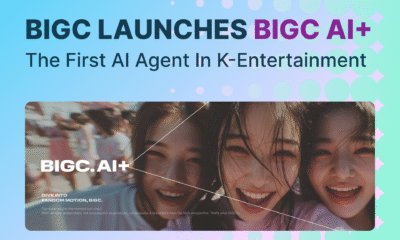AI Research
AI for Small Business: Reshaping SMBs for 2025

AI for small business is fundamentally reshaping how SMBs operate, driving growth through enhanced customer experiences, streamlined marketing, and innovative digital commerce.
The digital landscape has shifted dramatically, rendering traditional business models obsolete for many small and medium-sized businesses (SMBs). The era of static websites and social media as an afterthought is over. Now, adaptability and technological integration, particularly with artificial intelligence, are the hallmarks of success. According to the announcement, businesses that embrace these changes are thriving, with 73% of growing businesses keeping pace with technology, compared to only 42% of declining ones. The question for SMBs isn’t if their model will change, but how quickly they’ll lead the charge.
The most successful SMBs aren’t necessarily the oldest or largest; they’re the ones that pivot with market shifts, creating experiences rather than just selling products. This means moving beyond one-time transactions to building lasting customer relationships, often powered by flexible, AI-driven technologies.
One of the most impactful shifts is the rise of AI Software as a Service (SaaS) solutions. These cloud-based tools leverage AI for everything from data analysis and automation to customer service, all without complex installations. AI SaaS makes advanced capabilities accessible, allowing teams to collaborate globally and personalize customer interactions at scale. Imagine chatbots providing instant answers, support tools flagging issues proactively, and product recommendations tailored to individual browsing histories. Businesses implementing AI for customer experience report a 10-15% increase in revenue and a 15-20% reduction in service costs. Modern AI-powered CRM systems, for instance, automate follow-ups, surface key insights, and deliver personalized experiences, making sophisticated tools simple and affordable for even the smallest teams.
Small-scale marketing agencies are also redefining their value proposition by integrating AI. These agencies offer a hybrid solution, providing expert advice and easy-to-use tools without the overhead of a full-time marketing department or a large agency. They can help a local café with Instagram content or assist startups in boosting website traffic. By leveraging AI-powered CRM platforms, these consultants can track results, ensure consistency, and transfer knowledge, offering enterprise-level marketing capabilities at a fraction of the cost.
The AI-Powered Retail and Sharing Revolution
Digital commerce has evolved beyond simple online transactions into an immersive experience. Augmented reality (AR) allows customers to virtually place a sofa in their living room or try on glasses before buying. This transformation empowers small businesses to offer sophisticated, interactive shopping experiences previously exclusive to large brands. Modern e-commerce tools, often integrated with AI-powered CRMs, simplify online store setup, handle security, and personalize recommendations, bridging the gap between physical and digital retail. AI-powered live chats ensure customers feel supported, making online shopping as welcoming as an in-store visit.
Finally, the global sharing economy continues to expand, driven by digital platforms that connect individuals to rent or share assets like rooms or cars. This model turns idle resources into income and offers consumers affordable alternatives to ownership. AI is crucial here, facilitating smart matching systems, secure payments, and trust-building through verified profiles and reviews. These platforms use AI to monitor for unusual activity and provide support, ensuring smooth operations and compliance in a rapidly evolving regulatory landscape.
For SMBs, the message is clear: embracing AI isn’t just about efficiency; it’s about survival and growth. The future belongs to those who adapt, leveraging AI to build stronger customer relationships, streamline operations, and unlock new revenue streams.
AI Research
Top AI Code Generation Tools of 2025 Revealed in Info-Tech Research Group’s Emotional Footprint Report
The recently published 2025 AI Code Generation Emotional Footprint report from Info-Tech Research Group highlights the top AI code generation solutions that help organizations streamline development and support innovation. The report’s insights are based on feedback from users on the global IT research and advisory firm’s SoftwareReviews platform.
TORONTO, Sept. 3, 2025 /PRNewswire/ – Info-Tech Research Group has published its 2025 AI Code Generation Emotional Footprint report, identifying the top-performing solutions in the market. Based on data from SoftwareReviews, a division of the global IT research and advisory firm, the newly published report highlights the five champions in AI-powered code generation tools.
AI code generation tools make coding easier by taking care of repetitive tasks. Instead of starting from scratch, developers get ready-made snippets, smoother workflows, and support built right into their IDEs and version control systems. With machine learning and natural language processing behind them, these tools reduce mistakes, speed up projects, and give developers more room to focus on creative problem solving and innovation.
Info-Tech’s Emotional Footprint measures high-level user sentiment. It aggregates emotional response ratings across 25 proactive questions, creating a powerful indicator of overall user feeling toward the vendor and product. The result is the Net Emotional Footprint, or NEF, a composite score that reflects the overall emotional tone of user feedback.
Data from 1,084 end-user reviews on Info-Tech’s SoftwareReviews platform was used to identify the top AI code generation tools for the 2025 Emotional Footprint report. The insights support organizations looking to streamline development, improve code quality, and scale their software delivery capabilities to drive innovation and business growth.
The 2025 AI Code Generation Tools – Champions are as follows:
- Visual Studio IntelliCode, +96 NEF, ranked high for delivering more than promised.
- ChatGPT 5, +94 NEF, ranked high for its effectiveness.
- GitHub Copilot, +94 NEF, ranked high for its transparency.
- Replit AI, +96 NEF, ranked high for its reliability.
- Amazon Q Developer, +94 NEF, ranked high for helping save time.
Analyst Insight:
“Organizations that adopt AI code generation tools gain a significant advantage in software delivery and innovation,” says Thomas Randall, a research director at Info-Tech Research Group. “These tools help developers focus on complex, high-value work, improve code quality, and reduce errors. Teams that delay adoption risk slower projects, lower-quality software, and missed opportunities to innovate and stay competitive.”
User assessments of software categories on SoftwareReviews provide an accurate and detailed view of the constantly changing market. Info-Tech’s reports are informed by the data from users and IT professionals who have intimate experience with the software throughout the procurement, implementation, and maintenance processes.
Read the full report: Best AI Code Generation Tools 2025
For more information about Info-Tech’s SoftwareReviews, the Data Quadrant, or the Emotional Footprint, or to access resources to support the software selection process, visit softwarereviews.com.
About Info-Tech Research Group
Info-Tech Research Group is one of the world’s leading research and advisory firms, proudly serving over 30,000 IT and HR professionals. The company produces unbiased, highly relevant research and provides advisory services to help leaders make strategic, timely, and well-informed decisions. For nearly 30 years, Info-Tech has partnered closely with teams to provide them with everything they need, from actionable tools to analyst guidance, ensuring they deliver measurable results for their organizations.
To learn more about Info-Tech’s divisions, visit McLean & Company for HR research and advisory services and SoftwareReviews for software buying insights.
Media professionals can register for unrestricted access to research across IT, HR, and software, and hundreds of industry analysts through the firm’s Media Insiders program. To gain access, contact [email protected].
For information about Info-Tech Research Group or to access the latest research, visit infotech.com and connect via LinkedIn and X.
About SoftwareReviews
SoftwareReviews is a division of Info-Tech Research Group, a world-class technology research and advisory firm. SoftwareReviews empowers organizations with the best data, insights, and advice to improve the software buying and selling experience.
For buyers, SoftwareReviews’ proven software selection methodologies, customer insights, and technology advisors help maximize success with technology decisions. For providers, the firm helps build more effective marketing, product, and sales processes with expert analysts, how-to research, customer-centric marketing content, and comprehensive analysis of the buyer landscape.
SOURCE Info-Tech Research Group

AI Research
Vanderbilt launches Enterprise AI and Computing Innovation Studio

Vanderbilt University has established the Enterprise AI and Computing Innovation Studio, a groundbreaking collaboration between VUIT, the Amplify Generative AI Innovation Center and the Data Science Institute. This studio aims to prototype and pilot artificial intelligence–driven innovations that enhance how we learn, teach, work and connect.
Each of the partner areas has a strong record of addressing challenges and solving problems independently. By uniting this expertise, the studio can accelerate innovation and expand the capacity of the university to harness emerging technologies to support its mission.
Through the studio, students will have immersive experiences collaborating on AI-focused projects. Staff will deepen their skills through engagement with AI research. In addition, the studio underscores Vanderbilt’s position as a destination for global talent in artificial intelligence and related fields.
Members of the university community who have specific challenges or opportunities that AI may solve or address can submit a consultation request.
AI Research
Northwestern Magazine: Riding the AI Wave

Although Hammond says he barely remembers his life before computers and coding, there was indeed a time when his world was much more analog. Hammond grew up on the East Coast and spent his high school years in Salt Lake City, where his mother was a social worker and his father was a professor of archaeology at the University of Utah. Over the course of 50 years, Philip C. Hammond excavated several sites in the Middle East and made dozens of trips to Jordan, earning him the nickname Lion of Petra. Kris joined these expeditions for three summers, working as his father’s surveyor and draftsman.
“Now, once a week, I ask ChatGPT for a biography of my father, as an experiment,” Hammond says, bemused. “Sometimes, it gives me a beautifully inaccurate bio that makes him sound like Indiana Jones. Other times, it says he is a tech entrepreneur and that I have followed in his footsteps.”
While those biographical tidbits are more AI-generated falsehoods, Hammond and his father have both traced intelligence from different worlds — one etched in stone and another in silicon. Wanting a deeper understanding of the meaning of intelligence and thought, Hammond studied philosophy as an undergraduate at Yale University and planned to go law school after graduation. But his trail diverged when a fellow member of a local sci-fi club suggested that Hammond, who had taken one computer science class, try working as a programmer.
“After nine months as a programmer, I decided that’s what I wanted to do for a living,” Hammond says.
That sci-fi club guy was Chris Riesbeck, who is also now a professor of computer science at McCormick. Hammond earned his doctorate in computer science from Yale in 1986. But he didn’t abandon philosophy entirely. Instead, he applied those abstract frameworks — consciousness, knowledge, creativity, logic and the nature of reason — to the pursuit of intelligent systems.
“The structure of thought always fascinated me,” Hammond says. “Looking at it from the perspective of how humans think and how machines ‘think’ — and how we can ‘think’ together — became a driver for me.”
But the word “think” is tenuous in this context, he says. There’s a fundamental and important distinction between true human cognition and what current AI can do — namely, sophisticated mimicry. AI isn’t trying to critically assess data to devise correct answers, says Hammond. Instead, it’s a probabilistic engine, sifting through language likelihoods to finish a sentence — like the predictive text you might see on your phone while composing a message. It is seeking the most likely conclusion to any given string of words.
“These are responsive systems,” he says. “They aren’t reasoning. They just hold words together. That’s why they have problems answering questions about recent events.”
-

 Business5 days ago
Business5 days agoThe Guardian view on Trump and the Fed: independence is no substitute for accountability | Editorial
-
Tools & Platforms3 weeks ago
Building Trust in Military AI Starts with Opening the Black Box – War on the Rocks
-

 Ethics & Policy1 month ago
Ethics & Policy1 month agoSDAIA Supports Saudi Arabia’s Leadership in Shaping Global AI Ethics, Policy, and Research – وكالة الأنباء السعودية
-

 Events & Conferences4 months ago
Events & Conferences4 months agoJourney to 1000 models: Scaling Instagram’s recommendation system
-

 Jobs & Careers2 months ago
Jobs & Careers2 months agoMumbai-based Perplexity Alternative Has 60k+ Users Without Funding
-

 Education2 months ago
Education2 months agoVEX Robotics launches AI-powered classroom robotics system
-

 Funding & Business2 months ago
Funding & Business2 months agoKayak and Expedia race to build AI travel agents that turn social posts into itineraries
-

 Podcasts & Talks2 months ago
Podcasts & Talks2 months agoHappy 4th of July! 🎆 Made with Veo 3 in Gemini
-

 Podcasts & Talks2 months ago
Podcasts & Talks2 months agoOpenAI 🤝 @teamganassi
-

 Education2 months ago
Education2 months agoAERDF highlights the latest PreK-12 discoveries and inventions



















